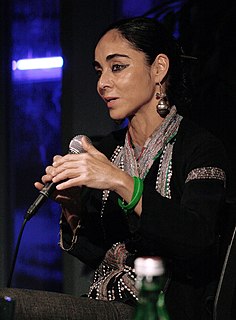A Quote by Shirin Neshat
Part of me has always resisted the Western clichéd image of Muslim women, depicting them as nothing more than silent victims. My art, without denying 'repression,' is a testimony to unspoken female power and the continuing protest in Islamic culture.
Related Quotes
The "female culture" has shifted more rapidly than the "male culture"; the image of the go-get 'em woman has yet to be fully matched by the image of the let's take-care-of-the-kids- together man. More important, over the last thirty years, men's underlying feelings about taking responsibility at home have changed much less than women's feelings have changed about forging some kind of identity at work.
History has proven that art depicting black people cannot be disentangled from the political implications that such art has on their lives. As Africans were being stripped from the continent and sailed across the Atlantic to the Western world, depictions of black people in Western art changed in order to further render them racialized caricatures.
If you read a lot of Chinese literature, there has always been very strong women figures - warriors, swordswomen - who defended honor and loyalty with the men. So, it's not new to our culture - it's always been very much a part of it. It's good that now the Western audience would have a different image of the Chinese women.
I am always revolted when Islamic leaders, from Afghanistan or elsewhere, deny the very existence of female oppression, avoid the issue by pointing to examples of what they view as Western mistreatment of women, or even worse, justify the oppression of women on the basis of notions derived from Sharia law.
Most victims of ISIL are, in fact, Muslims. So it seems to me that to refer to ISIL as occupying any part of the Islamic theology is playing on a - a battlefield that they would like us to be on. I think that to call them - to call them some form of Islam gives the group more dignity than it deserves, frankly.
It is for Muslim scholars to study the whole history of Islamic science completely and not only the chapters and periods which influenced Western science. It is also for Muslim scholars to present the tradition of Islamic science from the point of view of Islam itself and not from the point of view of the scientism, rationalism and positivism which have dominated the history of science in the West since the establishment of the discipline in the early part of the 20th century in Europe and America.
if networks of women are formed, they should be job related and task related rather than female-concerns related. Personal networks for sociability in the context of a work organization would tend to promote the image of women contained in the temperamental model - that companies must compensate for women's deficiencies and bring them together for support because they could not make it on their own. But job-related task forces serve the social-psychological functions while reinforcing a more positive image of women.







































